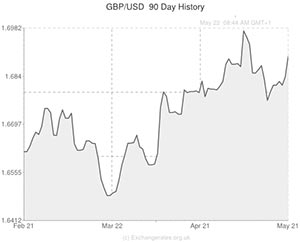
The Pound to US Dollar exchange rate (GBP/USD) rallied mildly yesterday evening in response to the latest FOMC minutes.
The minutes from the Federal Reserve’s meeting on April 29-30th did not reveal any groundbreaking news but merely confirmed that policymakers are in no rush to start raising interest rates:
“The committee continues to anticipate…that it likely will be appropriate to maintain the current target range for the federal funds rate for a considerable time after the asset purchase programme ends, especially if projected inflation continued to run below the committee’s 2.0% longer-run goal.”
The dovish remarks sent GBP/USD back above 1.6900 yesterday evening.
Sturdy UK retail sales & BoE minutes
Earlier on in the day demand for the Pound increased as investors reacted to an optimistic set of reports in the United Kingdom.
GBP to USD grew by around 0.8 cents from 1.6840 to 1.6920 during the morning, but Sterling was unable to assert itself above technical resistance and receded to 1.6880 during the afternoon.
The ONS announced that retail sales increased by 1.3% in April. The upbeat figure thrashed economists’ forecasts of 0.4% and bodes well for second quarter GDP performance. Although the late Easter holiday is thought to have boosted sales volumes the huge divergence between the actual result and the score that was expected suggests that underlying consumer spending trends will likely remain strong in coming months.
Staggeringly, the 6.9% annual expansion of the retail sector represented the best result in over a decade.
The other piece of news that had investors updating their rate hike bets and piling into the Pound was the Bank of England’s latest minutes report.
The central bank literature highlighted a shift in sentiment among some policymakers. Although the nine-man Monetary Policy Committee voted unanimously against raising rates this time out, there were hints that some members could start to vote for monetary tightening in the near future:
“For some members, the monetary policy decision was becoming more balanced. It could be argued that the more gradual the intended rise in the bank rate, the earlier it might be necessary to start tightening policy.”
The conflicting opinions between policymakers regarding the right time to start raising augurs bodes well for the Pound. However, it is difficult – nigh on impossible – to predict when the BoE will begin its hiking cycle. This is because all projections rely on the future performance of the British economy keeping pace with the rapid expansion that we have witnessed in the last few months.
Another factor that is muddying the waters is the appointment of two new policymakers. By the end of the summer Nemat Shafik and Krisitin Forbes will sit on the Monetary Policy Committee. It is unknown whether they will bring a dovish or a hawkish edge to the table, making it even more difficult to accurately predict the date of the first rate hike.

Comments are closed.